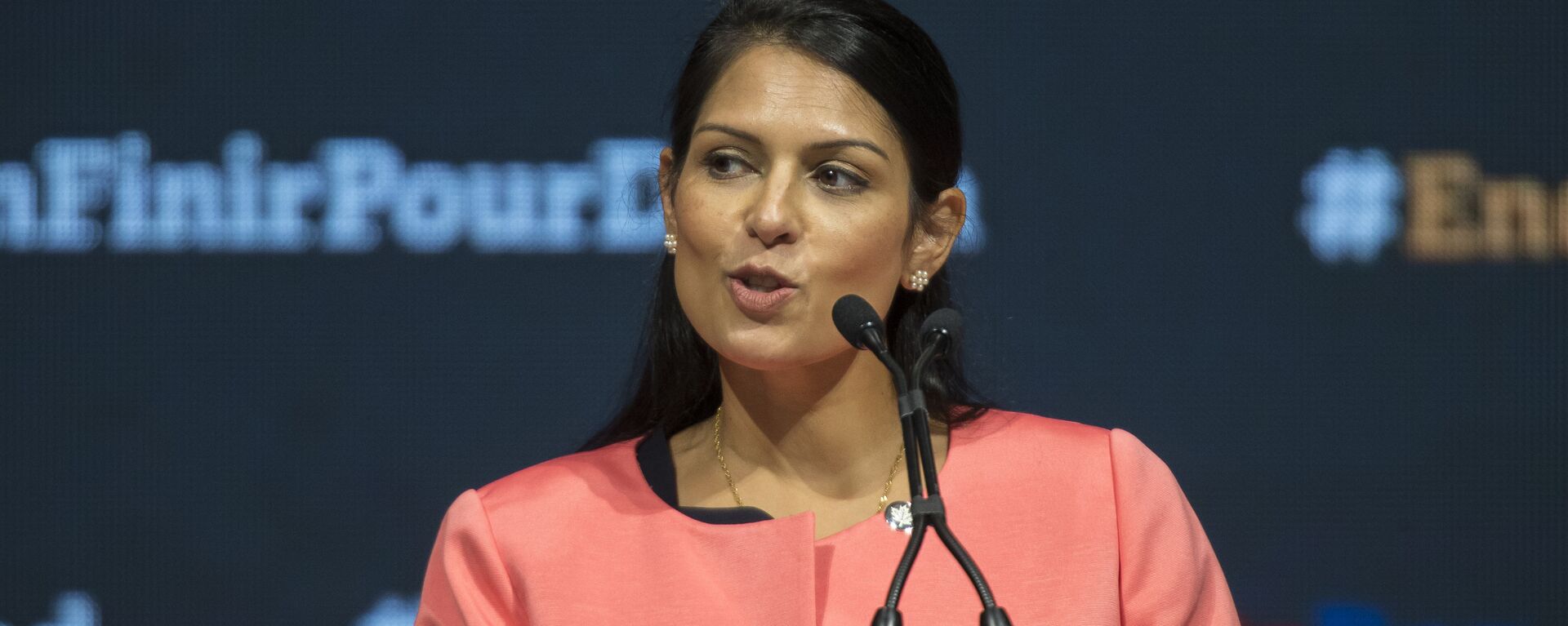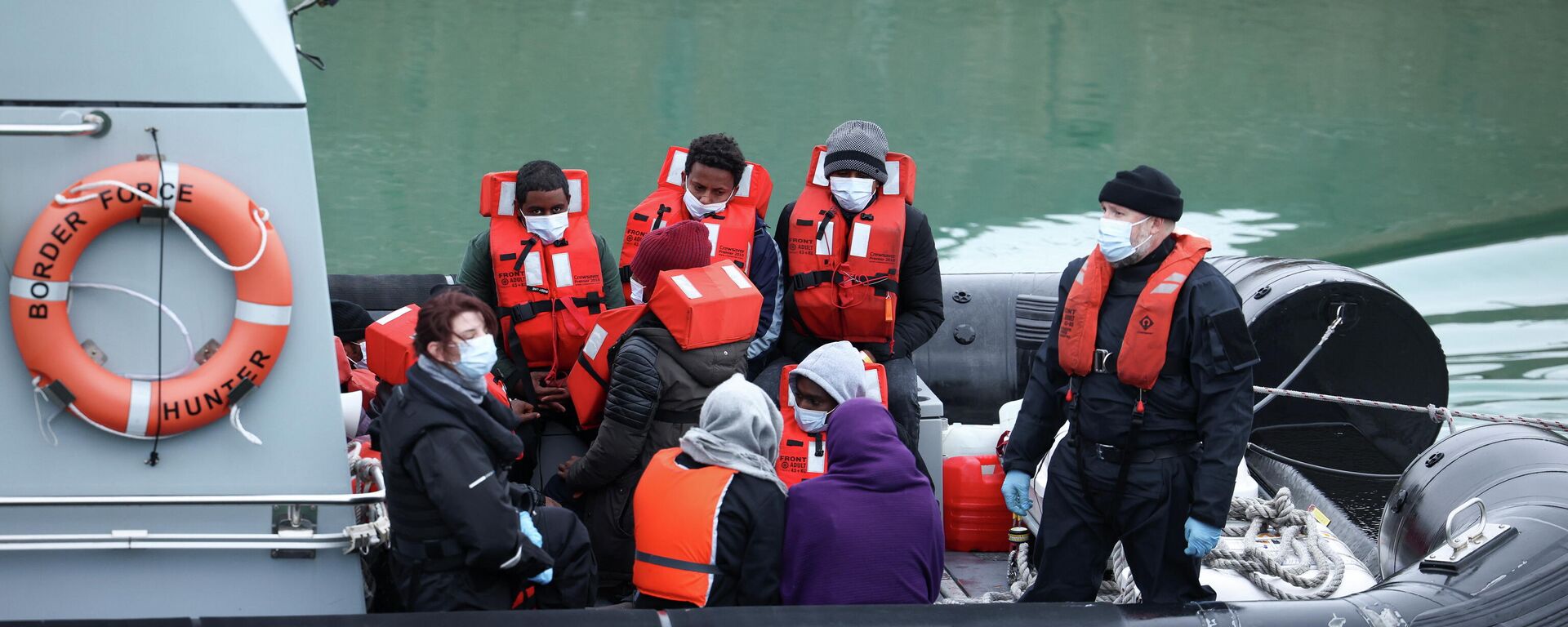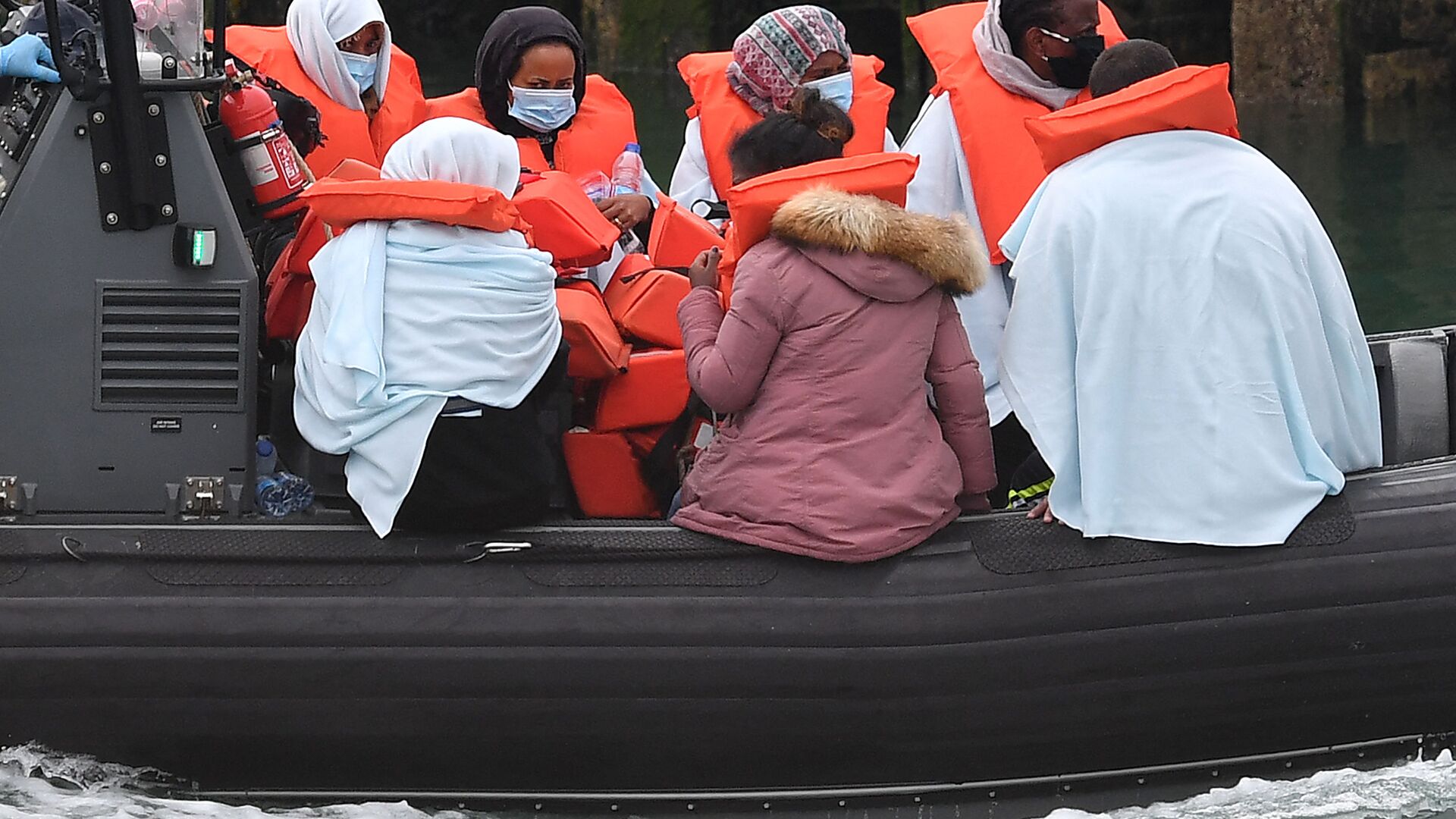https://sputnikglobe.com/20211123/bojo-facing-channel-crossing-dilemma--sending-refugees-to-falklands-not-an-option-observers-say-1090956205.html
BoJo Facing Channel Crossing Dilemma & Sending Refugees to Falklands Not an Option, Observers Say
BoJo Facing Channel Crossing Dilemma & Sending Refugees to Falklands Not an Option, Observers Say
Sputnik International
The UK PM's team has again come under fire from the opposition with Home Secretary Priti Patel being accused by Labour of "failing" to curb Channel crossings... 23.11.2021, Sputnik International
2021-11-23T12:44+0000
2021-11-23T12:44+0000
2023-05-28T15:17+0000
france
boris johnson
world
europe
opinion
english channel
falkland islands
asylum seekers
refugee crisis
priti patel
https://cdn1.img.sputnikglobe.com/img/07e5/08/08/1083552996_0:150:3000:1838_1920x0_80_0_0_a4d9df3e5db6a42a9ca73a323365a67a.jpg
A new wave of criticism from Labour came on the heels of reports saying that the British premier has grown "exasperated" with the unfolding situation and ordered a review into Channel crossings. Over 25,600 people have crossed the Channel in small boats in 2021, almost tripling last year's total of 8,417, according to government figures.Heads Won't Roll in Near FutureBoris Johnson is unlikely to crack down on Patel despite repeated speculations that he's "furious" at the home secretary over the growing channel crossings, according to Tony Smith, global border security consultant and former director-general of the UK Border Force.Earlier, Conservative MPs reportedly told The Sun that "Boris has a soft spot for Patel and she is broadly unsackable since the reshuffle." However, BoJo's attitude towards her appears to be guided by mere pragmatism, given that she has long been loyal to him and supported him during his successful bid to become party leader, according to Professor Darren Lilleker, lecturer and researcher in political communication at Bournemouth University.BoJo's Post-Brexit Refugee DilemmaThe BoJo cabinet has repeatedly vowed to make Channel crossings unviable. Meanwhile, the PM's failure to fix the problem is threatening political support to his government, according to the press, even though the total number of asylum seekers entering the UK fell by 4 percent in the year ending June 2021 and stands at less than 50 percent what it used to be in the early 2000s.Under international law, refugees do not have to seek asylum in the first safe country they arrive in; they can claim asylum in whichever country they enter. Given this, the British premier called upon Paris earlier this month to "close off" the flow of migrants crossing into France in order to stop them from sailing to the UK. British Conservatives even went so far as to offer to send British troops and a border force to France.The UK has an obligation to take responsibility for human lives, especially given that refugees are being carried by "very unseaworthy vessels," notes the border security consultant. Having been taken on British vessel boards, refugees immediately claim asylum in the United Kingdom, and that makes it very difficult to remove them, he explains."So what's really needed is an agreement, a new agreement after Brexit between the UK and the EU about how to stop smuggling, how to set up joint patrols," Smith says. "And to ensure that people are not allowed to go and claim asylum in any country they want to, but that they would normally only claim asylum once and that would be in the first safe third country they arrive at."Sending Asylum Seekers to Falklands Not an OptionMeanwhile, the Tories are considering all means available to crack down on human smugglers and fix the UK's asylum system. In particular, Conservative MPs are urging the home secretary to set up offshore centres as far away as the Falkland Islands to process people who attempt to reach Britain's shores in small boats.Tony Smith appears to share Lilleker's scepticism; according to him, offshore processing is "extremely difficult.""We need to find other ways of doing it," the border security expert insists. "I think that will be more about how we work with source and transit countries to stop people getting here in the first place rather than setting up an offshore processing centre, which may be many thousands of miles away."According to Smith, a possible way out at this stage is a new legislative initiative aimed at reinterpreting Article 31 of the Refugee Convention, "so that people who arrive on routes which are from safe third countries like France will be distinguished from refugees coming directly from places like Afghanistan.""In those circumstances, people who enter this country illegally may be prosecuted for illegal entry," he suggests. "They may be detained."He also expects "a concerted effort now to remove more people from the UK who have no right to be" in the country. More agreements are also needed with source and transit countries on stopping international organised crime and on returning illegal migrants once they came, according to Smith.Meanwhile, the Tories' proposals aimed at curbing Channel crossings have prompted ire from British liberals over what they have blasted as an attempt to "scrap" human rights. Therefore, The Observer presumed that Priti Patel's border crisis is "fake" and designed to crack down on legitimate asylum seekers. The Refugee Council's research released last week suggests that most people crossing the Channel – including Iranians, Iraqis, Eritreans, and Syrians – are refugees fleeing persecution.
https://sputnikglobe.com/20211122/channel-migrant-crisis-has-priti-patel-battling-to-stay-in-job-despite-bojos-soft-spot-for-her-1090917517.html
https://sputnikglobe.com/20211123/france-reportedly-rebuffed-uk-bid-to-patrol-its-beaches-for-migrants-over-sovereignty-concerns--1090947209.html
france
english channel
falkland islands
united kingdom (uk)
Sputnik International
feedback@sputniknews.com
+74956456601
MIA „Rosiya Segodnya“
2021
News
en_EN
Sputnik International
feedback@sputniknews.com
+74956456601
MIA „Rosiya Segodnya“
Sputnik International
feedback@sputniknews.com
+74956456601
MIA „Rosiya Segodnya“
france, boris johnson, europe, opinion, english channel, falkland islands, asylum seekers, refugee crisis, priti patel, united kingdom (uk)
france, boris johnson, europe, opinion, english channel, falkland islands, asylum seekers, refugee crisis, priti patel, united kingdom (uk)
BoJo Facing Channel Crossing Dilemma & Sending Refugees to Falklands Not an Option, Observers Say
12:44 GMT 23.11.2021 (Updated: 15:17 GMT 28.05.2023) The UK PM's team has again come under fire from the opposition with Home Secretary Priti Patel being accused by Labour of "failing" to curb Channel crossings by migrants. What's behind the UK's unfolding refugee crisis and how is No 10 going to address it?
A new wave of criticism from Labour came on the heels of reports saying that the British premier has grown "exasperated" with the unfolding situation and ordered a review into Channel crossings. Over 25,600 people have crossed the Channel in small boats in 2021, almost tripling last year's total of 8,417, according to government figures.
Heads Won't Roll in Near Future
Boris Johnson is unlikely to crack down on Patel despite repeated speculations that he's "furious" at the home secretary over the growing channel crossings, according to Tony Smith, global border security consultant and former director-general of the UK Border Force.
"I don't think she's facing the chop as such," Smith says. "I think she is facing some considerable difficulties in managing the migrant crisis in the English Channel at the moment," says Smith. "So what's happened is the British government has decided that her department, the Home Office, needs some help. So they have announced now that there will be a cross-departmental task force involving other departments, which will look at the migrant crisis in a broader canvas and see how the Priti Patel department can be helped to stop the boats."
Earlier, Conservative MPs reportedly told The Sun that "Boris has a soft spot for Patel and she is broadly unsackable since the reshuffle." However, BoJo's attitude towards her appears to be guided by mere pragmatism, given that she has long been loyal to him and supported him during his successful bid to become party leader, according to Professor Darren Lilleker, lecturer and researcher in political communication at Bournemouth University.

22 November 2021, 08:44 GMT
BoJo's Post-Brexit Refugee Dilemma
The BoJo cabinet has repeatedly
vowed to make Channel crossings unviable. Meanwhile, the PM's failure to fix the problem is threatening political support to his government, according to the press, even though the total number of asylum seekers entering the UK fell by 4 percent in the year ending June 2021 and stands at less than 50 percent what it used to be in the early 2000s.
"The migrant crisis is an intractable problem," says Lilleker. "Very few of the migrants are asylum seekers, for whom there are laws. Those who are should seek asylum in the first safe country they reach. Those who are simply migrating do not have to be given sanctuary by any country and can be allowed to pass through or blocked entry. The EU is largely unable to stop migrants entering its borders, mostly this is done illegally."
Under international law, refugees do not have to seek asylum in the first safe country they arrive in; they can claim asylum in whichever country they enter. Given this, the British premier called upon Paris earlier this month to "close off" the flow of migrants crossing into France in order to stop them from sailing to the UK. British Conservatives even went so far as to offer to send British troops and a border force to France.
"What France does on its border and what the EU does on its border is, of course, a matter for them," says Smith. "It's not for the UK government to decide what happens on the French border… The UK has given 54 million pounds to the French government to enable them to recruit more police officers to patrol the beaches to stop the boats. But the difficulty we have is that although that works to an extent, once people are actually in a boat and on the water, then the French position is they won't intervene. They will simply shepherd the boats towards British territorial waters."
The UK has an obligation to take responsibility for human lives, especially given that refugees are being carried by "very unseaworthy vessels," notes the border security consultant. Having been taken on British vessel boards, refugees immediately claim asylum in the United Kingdom, and that makes it very difficult to remove them, he explains.
"So what's really needed is an agreement, a new agreement after Brexit between the UK and the EU about how to stop smuggling, how to set up joint patrols," Smith says. "And to ensure that people are not allowed to go and claim asylum in any country they want to, but that they would normally only claim asylum once and that would be in the first safe third country they arrive at."

23 November 2021, 07:21 GMT
Sending Asylum Seekers to Falklands Not an Option
Meanwhile, the Tories are considering all means available to crack down on human smugglers and fix the UK's asylum system. In particular, Conservative MPs are urging the home secretary to set up offshore centres as far away as the Falkland Islands to process people who attempt to reach Britain's shores in small boats.
"The Falklands is a very high-cost option and not sure if that is seriously on the table," suggests Darren Lilleker. "Even other islands are a long way away and would involve special ships being chartered to move people from detention centre to detention centre."
Tony Smith appears to share Lilleker's scepticism; according to him, offshore processing is "extremely difficult."
"We need to find other ways of doing it," the border security expert insists. "I think that will be more about how we work with source and transit countries to stop people getting here in the first place rather than setting up an offshore processing centre, which may be many thousands of miles away."
According to Smith, a possible way out at this stage is a new legislative initiative aimed at reinterpreting Article 31 of the Refugee Convention, "so that people who arrive on routes which are from safe third countries like France will be distinguished from refugees coming directly from places like Afghanistan."
"In those circumstances, people who enter this country illegally may be prosecuted for illegal entry," he suggests. "They may be detained."
He also expects "a concerted effort now to remove more people from the UK who have no right to be" in the country. More agreements are also needed with source and transit countries on stopping international organised crime and on returning illegal migrants once they came, according to Smith.
Meanwhile, the Tories' proposals aimed at curbing Channel crossings have prompted ire from British liberals over what they have blasted as an attempt to "scrap" human rights. Therefore, The Observer
presumed that Priti Patel's border crisis is "fake" and designed to crack down on legitimate asylum seekers. The Refugee Council's research
released last week suggests that most people crossing the Channel – including Iranians, Iraqis, Eritreans, and Syrians – are refugees fleeing persecution.
"Asylum seekers still try to reach the UK in modest numbers, some because they have family here, others because they already speak English," argues the Observer editorial. "Making the material conditions once they get here even worse is unlikely to put off people fleeing conflict who are desperate to reach somewhere where they can build a new life."






